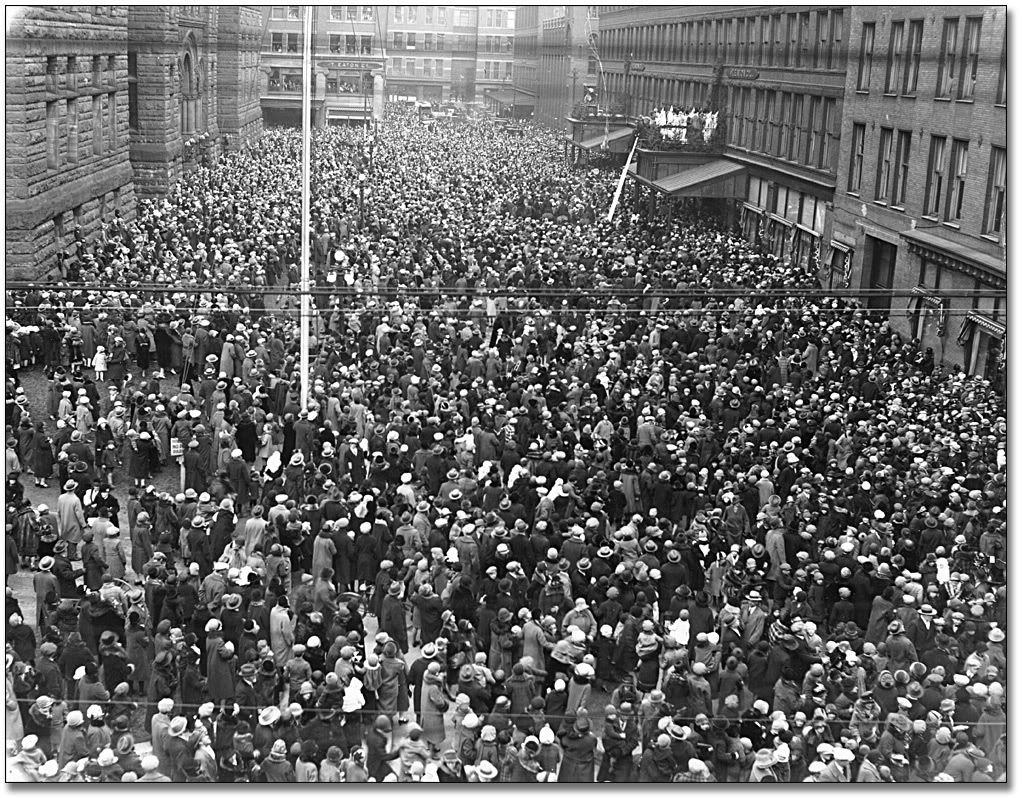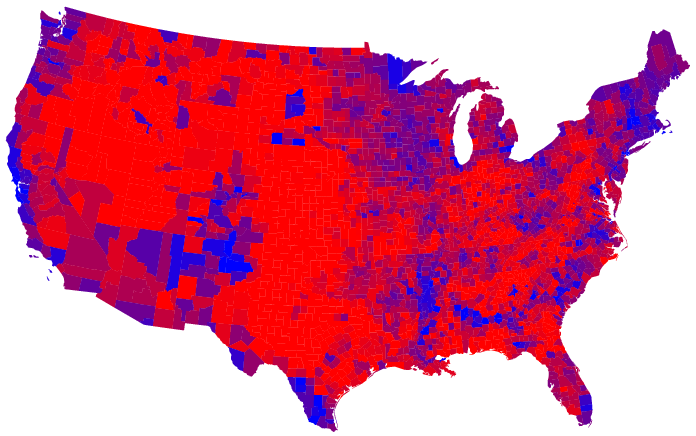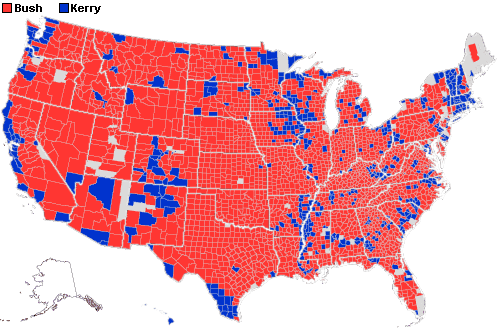
I know I've covered this before, but people keep bringing it up. A recent CNN website poll asked us how the Democratic candidate should best be chosen -- by delegates or popular vote. Overwhelmingly, the respondents picked "popular vote."
We have lived with this myth now for well over 100 years: that somehow, "popular vote" gets us the best candidate. It only takes a review of history to realize that some of our best presidents were not elected by popular vote. As I look at our three apparent front-runners for the US presidency, I have to ask, "Is this really the best we can do?" Somehow, I do not think I am the lone voice on this issue.
Is McCain really the best that the Republican party can do? Most Republicans don't seem to think so, yet McCain was elected by popular vote. He got a little help from the Guiliani states -- the ones that Rudy "gerrymandered" before the primaries began -- the idiotic "winner take all" idea that robs delegates of any true representative power. If popular vote gets the candidate the people want most, why aren't Republicans out en masse singing McCain's praises? Simply because popular vote does not work.
I see all the enthusiastic rallies for the two Democratic contenders. I see the ridiculous logic of women interviewed every night, "I'm voting for Hillary because she's a woman!" What in-depth thought! What intelligent analysis of the needs of our republic! "She has two X chromosomes, so I'm going to vote for her." That's popular vote speaking. We could say the same things about Obama. He deserves to be considered because of his record, his preparation, his convictions, his philosophies. Yet his candidacy is reduced each evening to a simple trait: his color. I hear Martin Luther King spinning in his grave. More than ever, we are judging people not by the "content of their character," but rather by the color of their skin or the number of x and y chromosomes they have.
When I was in high school, the cheerleaders were elected by popular vote. They would all come to an assembly of the rest of us, and perform their "try-outs," and then we would go to our classrooms and vote. While we were voting, I can never recall anyone commenting on athletic ability, on being able to say the right things to get the game crowd "in the spirit." I did hear things like "she's cute," or "she stole so-and-so's boyfriend." The cheerleader vote was a beauty contest, an analysis of trite things. No one took the ability to lead cheers into account. That's probably okay with high schools. No one is taking it that seriously anway. In the rare moments that they do, we get some macabre story of a woman hiring a hit man to "take out" another cheerleader candidate's mother. We don't want it to be serious.
But I think we do when we consider who will try to be our executive leader for the next four years. The last thing we need is a "popular vote" based on skin color, gender, or ability to convince enough voters that a candidate will do all the right things and push the right buttons.
Delegates are not perfect by any means, but they at least have a chance to seriously look at issues and make an informed choice. In times past, candidates have been elected in local precincts because people thought they were someone else. In the 70's, when I was a devout Republican, I once thought I was voting for George Bush (future 41) to be my local representative to the US house. After all, that's what it said on the ballot. I was surprised later to learn that I had voted for his kid, who was just in his twenties. What a dirty trick.
Some people don't even vote for a candidate. The lazy way is to just check the box at the top, and vote for a party. That may have even worked in times past, but it means nothing now. There are good candidates for local elections in both parties, and it is a horrible thing to avoid one of them because someone tows a party line rather than showing the diligence to see who the candidates really are.
Most people don't know enough to vote anyway. I've voted ignorantly many times, and often, couldn't even remember who I voted for later.
Popular elections don't get the best people in place. Rembember 1972? The Nixon landslide? Love him or hate him, Nixon could not be called the "people's choice." He won because of the popular vote. Was he the best they had to offer at that point? I don't know. Many think he wasn't.
In 1976, I have problems believing that the Georgia peanut farmer was the best the Democrats could do. It was almost a "gimmee" election -- running against an unelected president who had replaced an indicted and resigned one. And Carter nearly lost anyway. Why? Can you say "popular vote primaries?"
What the Democrats need this year is a good delegate fight. I'm not talking about those superdelegates -- which is just a distribution of slot machine tokens to the war horses of the party. I'm talking about real human beings who do more than mark a ballot -- who hammer out issues, and determine party and platform policy. I would love to see Democrats come together for their national convention and go through the nightmare of a deadlock, to see them have to hammer out several agreements, and finally emerge with a dark horse candidate that didn't even spend the last 18 useless months kissing babies, drinking beer, and bowling. Maybe someone who was actually voting in the Senate or House during that time, or sitting in with the pundits determining policy. Someone who really knows what's going on -- whose spouse is not saying things that need to be explained away, or whose daughter is not saying "none of your business" to people who ask questions.
The Republicans need one of these types of conventions this year, too, but that's a pipe dream. They will have a coronation. The platform and policies will already be set, and there will be posturing and moving and shaking as the post-Bush Republican party hands out the cushy jobs and people move up in the shuffle. And McCain may or may not win, but it won't matter.
Both major parties are scared to death to do anything that the Founding Fathers intended in order to get a leader. They are also scared to do what their party founders sought in getting a candidate nominated.
We are condemned to mediocrity. Popular elections are possibly the worst way to choose a leader. Drawing straws might actually be better. Remember that some of the popularly elected leaders we have seen recently were named Hussein, Castro, and Chavez. Popular elections do not produce the kind of bold, wise leadership that our nation and others need.
That's why the Framers of the US Constitution were against them.
We have lived with this myth now for well over 100 years: that somehow, "popular vote" gets us the best candidate. It only takes a review of history to realize that some of our best presidents were not elected by popular vote. As I look at our three apparent front-runners for the US presidency, I have to ask, "Is this really the best we can do?" Somehow, I do not think I am the lone voice on this issue.
Is McCain really the best that the Republican party can do? Most Republicans don't seem to think so, yet McCain was elected by popular vote. He got a little help from the Guiliani states -- the ones that Rudy "gerrymandered" before the primaries began -- the idiotic "winner take all" idea that robs delegates of any true representative power. If popular vote gets the candidate the people want most, why aren't Republicans out en masse singing McCain's praises? Simply because popular vote does not work.
I see all the enthusiastic rallies for the two Democratic contenders. I see the ridiculous logic of women interviewed every night, "I'm voting for Hillary because she's a woman!" What in-depth thought! What intelligent analysis of the needs of our republic! "She has two X chromosomes, so I'm going to vote for her." That's popular vote speaking. We could say the same things about Obama. He deserves to be considered because of his record, his preparation, his convictions, his philosophies. Yet his candidacy is reduced each evening to a simple trait: his color. I hear Martin Luther King spinning in his grave. More than ever, we are judging people not by the "content of their character," but rather by the color of their skin or the number of x and y chromosomes they have.
When I was in high school, the cheerleaders were elected by popular vote. They would all come to an assembly of the rest of us, and perform their "try-outs," and then we would go to our classrooms and vote. While we were voting, I can never recall anyone commenting on athletic ability, on being able to say the right things to get the game crowd "in the spirit." I did hear things like "she's cute," or "she stole so-and-so's boyfriend." The cheerleader vote was a beauty contest, an analysis of trite things. No one took the ability to lead cheers into account. That's probably okay with high schools. No one is taking it that seriously anway. In the rare moments that they do, we get some macabre story of a woman hiring a hit man to "take out" another cheerleader candidate's mother. We don't want it to be serious.
But I think we do when we consider who will try to be our executive leader for the next four years. The last thing we need is a "popular vote" based on skin color, gender, or ability to convince enough voters that a candidate will do all the right things and push the right buttons.
Delegates are not perfect by any means, but they at least have a chance to seriously look at issues and make an informed choice. In times past, candidates have been elected in local precincts because people thought they were someone else. In the 70's, when I was a devout Republican, I once thought I was voting for George Bush (future 41) to be my local representative to the US house. After all, that's what it said on the ballot. I was surprised later to learn that I had voted for his kid, who was just in his twenties. What a dirty trick.
Some people don't even vote for a candidate. The lazy way is to just check the box at the top, and vote for a party. That may have even worked in times past, but it means nothing now. There are good candidates for local elections in both parties, and it is a horrible thing to avoid one of them because someone tows a party line rather than showing the diligence to see who the candidates really are.
Most people don't know enough to vote anyway. I've voted ignorantly many times, and often, couldn't even remember who I voted for later.
Popular elections don't get the best people in place. Rembember 1972? The Nixon landslide? Love him or hate him, Nixon could not be called the "people's choice." He won because of the popular vote. Was he the best they had to offer at that point? I don't know. Many think he wasn't.
In 1976, I have problems believing that the Georgia peanut farmer was the best the Democrats could do. It was almost a "gimmee" election -- running against an unelected president who had replaced an indicted and resigned one. And Carter nearly lost anyway. Why? Can you say "popular vote primaries?"
What the Democrats need this year is a good delegate fight. I'm not talking about those superdelegates -- which is just a distribution of slot machine tokens to the war horses of the party. I'm talking about real human beings who do more than mark a ballot -- who hammer out issues, and determine party and platform policy. I would love to see Democrats come together for their national convention and go through the nightmare of a deadlock, to see them have to hammer out several agreements, and finally emerge with a dark horse candidate that didn't even spend the last 18 useless months kissing babies, drinking beer, and bowling. Maybe someone who was actually voting in the Senate or House during that time, or sitting in with the pundits determining policy. Someone who really knows what's going on -- whose spouse is not saying things that need to be explained away, or whose daughter is not saying "none of your business" to people who ask questions.
The Republicans need one of these types of conventions this year, too, but that's a pipe dream. They will have a coronation. The platform and policies will already be set, and there will be posturing and moving and shaking as the post-Bush Republican party hands out the cushy jobs and people move up in the shuffle. And McCain may or may not win, but it won't matter.
Both major parties are scared to death to do anything that the Founding Fathers intended in order to get a leader. They are also scared to do what their party founders sought in getting a candidate nominated.
We are condemned to mediocrity. Popular elections are possibly the worst way to choose a leader. Drawing straws might actually be better. Remember that some of the popularly elected leaders we have seen recently were named Hussein, Castro, and Chavez. Popular elections do not produce the kind of bold, wise leadership that our nation and others need.
That's why the Framers of the US Constitution were against them.

